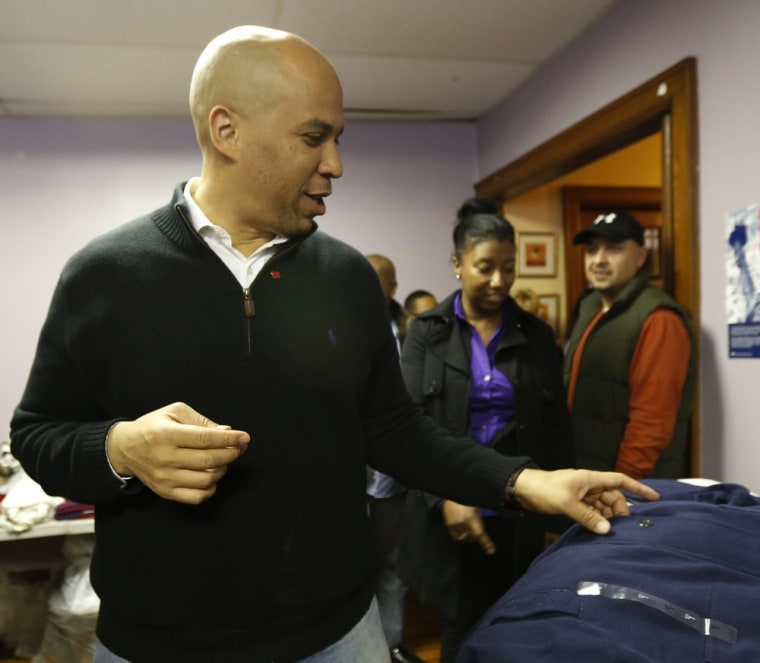Beginning on Tuesday of this week, Newark mayor Cory Booker started a seven day experiment living off food stamps. Poverty experts and food stamp recipients told msnbc that the so-called Food Stamp challenge was laudable, even if it doesn't necessarily give the Democratic rising star a true picture of what it means to live off food assistance.
"I don't think it's going to be a huge eye opener for him," said Heather Tarrant, a 34-year-old waitress and food stamp recipient living in New York City. "I hope watching him go through it is going to be an eye opener for other people."
Tarrant, who lives alone with her 15-year-old daughter, said that she relies on the $260 a month she receives in SNAP (Supplemental Nutrition Assistance Program) benefits to feed both of them.
"If I don't have food stamps, I get my daughter dinner and I don't eat," she said. Even with her part-time job waiting tables, she said, she runs out of her monthly SNAP allotment after the first three weeks.
In New Jersey, the average recipient gets about $133.26 in food stamps per month. Timothy Smeeding, director of University Madison-Wisconsin's Institute for Research on Poverty, said that, for the average family on food stamps, such a small allowance covers "a couple of boxes of cheap cereal, a gallon of milk, a few bananas, and then who knows what—chips, spaghetti, cheez-its, that's the diet. You're going to run out if you try to buy some expensive meats; maybe get some mystery meats."
However, cautioned Smeeding, just one week on food stamps wouldn't provide a full picture of what it's like to live off SNAP full-time. "What he should do is go on it for a month, not a week," he said.
Why? Because food stamp recipients live on a monthly cycle, and often find the end of the month far more challenging than the first week. When a family receives their SNAP benefits at the beginning of the month-long cycle, said Smeeding, "food flies off the shelves for the first two weeks of the month. But then the food stamps are gone—$300 worth of stamps are gone." As a result, "in the last two weeks of the month, business picks up at food pantries and soup kitchens."
"A soup kitchen I worked at in Syracuse, New York, had something we called the tupperware crowd," said Smeeding. "Mothers coming in asking for two portions to put in tupperware, to take in and feed their kids. All that extra money coming in at the end of the month is needed for rent."
After two weeks of soup kitchen food, the increasingly hungry family is likely to spend a large portion of its SNAP benefits at the beginning of the following month, perpetuating the cycle.
Lisa Dodson, a Boston College sociology professor, urged Booker to "include children in your conversation. Aside from what you're eating, ask moms what they're giving their kids if all they have is food stamps." She said that the "meager" benefits provided by the food stamps program have been a major driver of malnutrition and obesity among children of low-income families.
"Cheap foods tend to be foods that make you obese," she said. "Cheap calories tend to be the ones that are high in fat, and we know now that obesity is becoming the major public health problem."
Tarrant said that she and her daughter "eat well" largely because of the spices they're able to flavor simple meals with. However, spices and seasonings are expensive when one relies on SNAP. Once, she wrote, she was unable to make her daughter macaroni and cheese because she ran out of butter. With five days to go before she received her next round of benefits, "I just couldn't spend the two dollars to get a stick of butter."
"For a week [Booker] will be fine," said Tarrant, "but what happens when you run out of salt?"
New York City Coalition Against Hunger executive director Joel Berg has done his own version of the Food Stamp Challenge twice. He said that at first he was "skeptical" of the idea because, "I'm skeptical about anything that's short-lived, but gives people the impression, 'Oh, gee, I know what it's like.'" However, after his first week on food stamps, he decided, "It's an extraordinarily useful exercise, and an extraordinarily useful exercise to help the public understand it."
Booker, he said, should be sure to highlight the policy angle on the Food Stamp Challenge. "My greatest political hope is he turns this into a call to increase funding for these programs, so people can buy healthier food," he said.
Federal spending on SNAP is expected to decline in 2013, according to CBO projections [PDF], when legislation designed to boost funding for the program expires.
Like Berg, Dodson said it was crucial that food stamp funding be increased, not cut. "In looking at these programs and judging them, we should look at what nutritionists agree is reasonable, and not start with an amount of money," she said. "What health do we want our children to be in? Because most families that get food stamps have children in them."
